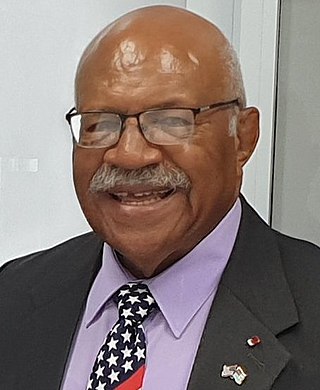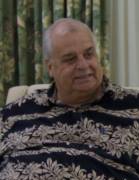Related Research Articles

Mahendra Pal Chaudhry is a Fijian politician and the leader of the Fiji Labour Party. Following a historic election in which he defeated the long-time former leader, Sitiveni Rabuka, the former trade union leader became Fiji's first Indo-Fijian Prime Minister on 19 May 1999, but exactly one year later, on 19 May 2000 he and most of his Cabinet were taken hostage by coup leader George Speight, in the Fiji coup of 2000. Unable to exercise his duties, he and his ministers were sacked by President Ratu Sir Kamisese Mara on 27 May; Mara intended to assume emergency powers himself but was himself deposed by the military leader, Commodore Frank Bainimarama.
Brigadier-General RatuEpeli Ganilau, MC, MSD, was a Fijian military officer and politician. His career previously encompassed such roles as Commander of the Fiji Military Forces and Chairman of the Bose Levu Vakaturaga. On 15 January 2007 he was sworn in as Minister for Fijian Affairs in the interim Cabinet formed in the wake of the 2006 Fijian coup d'état which deposed the Qarase government on 5 December 2006.

Sitiveni Ligamamada Rabuka is a Fijian politician, sportsman, and former soldier who has been serving as Prime Minister of Fiji since 24 December 2022. He was the instigator of two military coups in 1987. He was democratically elected as Prime Minister of Fiji, serving from 1992 to 1999, and again in 2022, leading a three-party coalition. He also served as Chairman of the Great Council of Chiefs from 1999 to 2001, and later as Chairman of the Cakaudrove Provincial Council from 2001 to 2008.

Josaia Voreqe "Frank" Bainimarama is a Fijian former politician and naval officer who served as the prime minister of Fiji from 2007 until 2022. A member of the FijiFirst party, which he founded in 2014, he began his career as an officer in the Fijian navy and commander of the Fijian military. Despite being suspended from Parliament, he served as the opposition leader from 24 December 2022 until 8 March 2023, when he resigned and was replaced by Inia Seruiratu.

The Fiji coup d'état of 2000 was a civilian coup d'état by hardline i-Taukei nationalists against the elected government of an Indo-Fijian Prime Minister, Mahendra Chaudhry on 19 May 2000. This was followed by an attempt on 27 May by President Ratu Sir Kamisese Mara to assert executive authority, and then by a military coup on 29 May by Republic of Fiji Military Forces Commander Commodore Frank Bainimarama.
Since attaining independence from the United Kingdom on 10 October 1970, Fijian history has been marked by exponential economic growth up to 1987, followed by relative stagnation, caused to a large extent by political instability following two military coups in 1987 and a civilian putsch in 2000. This was followed by another military coup in 2006. Rivalry between indigenous Fijians and Indo-Fijians, rather than ideological differences, have been the most visible cleavage of Fijian politics. Later in 2020, Fiji was hit by the global COVID-19 pandemic, which affected the economy and the daily lives of the people.
Josefa Bole Vosanibola is a former Fijian politician and Cabinet Minister. He is the father of former Social Democratic Liberal Party MP Peceli Vosanibola.

Mick Malcolm Millis Beddoes, widely known as Mick Beddoes, is a Fijian politician and businessman from Nadi, who led the United Peoples Party from 2000 to 2013, and was the Leader of the Opposition at the time of the military coup of 5 December 2006. He was also the Chief Executive of the World Netball Company, and was Chairman of the organising committee for the 2007 World Netball Championships, but announced his resignation on 24 January 2006, citing a possible conflict of interest, as his company would be working as a ground operator during the championships.
Mohammad Apisai Vuniyayawa Tora was a Fijian politician, soldier, and trade unionist. As a labour leader, he was a fighter for dock workers. As a soldier, he served in Malaya and later served as President of the Ex-Servicemen's League.
Adi Asenaca Coboiverata Caucau, generally known simply as Adi Asenaca Caucau, is a Fijian politician. She served as Minister For Women and Minister for Social Welfare and Poverty Alleviation from 2001 to 2006, when she became Minister of State for Housing. She held this post, and continued to represent the Tailevu South Lomaiviti Open Constituency in the House of Representatives until 5 December 2006, when the Military of Fiji staged a coup d'état and removed her government from office. She had first won the seat for the Soqosoqo Duavata ni Lewenivanua Party (SDL) in the parliamentary election of September 2001.

General elections were held in Fiji between 6 and 13 May 2006.

The tension between Fiji's government and military forces, which had been simmering for more than two years, appeared to escalate in late December 2005. Tension between the government and the military had been simmering throughout the year, with Commodore Bainimarama and other military officers making strongly worded public statements opposing certain government policies, including the early release from prison of persons implicated in the Fiji coup of 2000, and the government's promotion of controversial legislation to establish a Commission with the power to grant amnesty to perpetrators of the coup.

The crisis that saw a virtual breakdown in relations between Fiji's government and military forces in late 2005 and early 2006, generated fears of civil unrest and even a military coup. The dismissing of Lieutenant Colonel Jone Baledrokadroka, the Acting Land Force Commander, for alleged insubordination on 12 January 2006 was coupled with unusual deployments of troops and naval vessels. Both before and after it was resolved on 16 January with a truce brokered by Acting President Ratu Joni Madraiwiwi, the crisis generated a great deal of comment.
The Methodist Church of Fiji and Rotuma is the largest Christian denomination in Fiji, with 34.6% of the total population at the most recent 2007 census.

The Fijian coup d'état of December 2006 was a coup d'état in Fiji carried out by Commodore Frank Bainimarama against Prime Minister Laisenia Qarase and President Josefa Iloilo. It was the culmination of a political crisis that had begun the previous year when the Qarase government introduced three bills to the Fijian Parliament. The Qoliqoli, Land Tribunal, and Reconciliation, Tolerance, and Unity Bills dealt with the ongoing ethnic conflicts in Fiji and the aftermath of the 2000 coup, and were considered to be pro-ethnic Fijian. Bainimarama, the Commander of the Republic of Fiji Military Forces (RFMF), presented the government with a list of demands on October 16 that included withdrawing the bills. Attempts at negotiation failed and the military launched a coup on 4 December. Parliament was dissolved, Qarase and his cabinet were dismissed, and some civilian officials were placed under house arrest. After the Great Council of Chiefs refused to appoint a cabinet friendly to the military, Bainimarama reached an understanding with Iloilo and reinstated him as President on 4 January 2007. Iloilo then appointed Bainimarama acting Prime Minister in charge of the Interim Cabinet.

Fiji's fourth constitution, the 2013 Constitution of Fiji, was signed into law by President Ratu Epeli Nailatikau on 6 September 2013, coming into effect immediately. It is the first to eliminate race-based electoral rolls, race-based seat quotas, district-based representation, the unelected upper chamber, and the role of the hereditary Council of Chiefs. It vests sole legislative authority in a single-chamber, 50-seat, at-large Parliament, to be first convened following general elections in 2014. It is also the first ever to grant the right to multiple citizenship, and lowers the voting age to 18.

Lt Col Pio Tikoduadua is a Fijian politician, cabinet Minister and Member of the Parliament of Fiji. He is the current President of the National Federation Party.
Jone Baledrokadroka is a Fijian academic and former soldier who served briefly as Republic of Fiji Military Forces Land Force Commander in January 2006. He was dismissed from the post after only four days after RFMF Commander Frank Bainimarama accused him of planning a mutiny. He is the son of former senator and Taukei ni Waluvu Ratu Alipate Baledrokadroka and the brother of Senator Adi Lagamu Vuiyasawa. He is also the uncle for New Zealand netballer Erikana Pedersen.

General elections were held in Fiji on 14 December 2022 to elect the 55 members of Parliament. The elections took place following the passage of controversial electoral amendments.
The topic of racism is an ongoing and controversial issue in Fiji, especially in Fijian politics. Racism has been cited as one of the main reasons for the occurrence of coups d'état in Fiji in the past, with Fiji having had four coups, more than any other country in Oceania.
References
- ↑ "Fiji's New Nationalists say PM should resign". RNZ. 12 January 2006. Retrieved 4 April 2023.
- ↑ "Nationalist fears conflict among indigenous Fijians". BBC . 12 January 2006. Retrieved 22 January 2011.
If he has failed to pass the Land Bill, which is the heart and soul of the Fijian people, then he should resign ...
- ↑ "Fiji's New Nationalist Party reverses stance on ethnic Indians". RNZ. 20 January 2006. Retrieved 4 April 2023.
- ↑ "Call in Fiji to ban non-Christian religion from indigenous land". RNZ. 18 September 2006. Retrieved 4 April 2023.
- ↑ "Fijian nationalist leader apologises for remarks about ethnic Indians". RNZ. 12 January 2007. Retrieved 4 April 2023.
- ↑ "Two in trouble over Charter". Fiji Sun. 9 August 2008. Retrieved 4 April 2023.